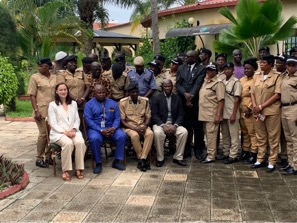
Held from September 30th to 3rd October at the Ocean Bay Hotel, the training sought to promote the protection of human rights within the prison system, improve maintenance standards, and establish a human rights unit within the department.
The training, which attracted key officials from the Gambia Prisons Department, also seeks to expose participants to general understanding of human rights principles and best practices for the treatment of prisoners.
The initiative aimed to reinforce respect for human rights across the prison system and address the findings and recommendations of the Truth, Reconciliation and Reparation Commission (TRRC), which highlighted significant gaps in the protection of human rights within the sector.
In his opening remarks, Njundu Drammeh, Commissioner at the National Human Rights Commission, who represented the Chairman, underscored the importance of the exercise, reminding participants of the country’s past atrocities.
"Once upon a time, not everything was right in The Gambia. In fulfillment of the 'Never Again' campaign, it is necessary to gather and discuss the way forward with prison officers. A nation without security and respect for human rights will only lead to chaos," he stated.
Drammeh reiterated that while prisoners' liberty may be forfeited, their basic human rights must always be upheld, calling for dignified treatment and protection for all incarcerated individuals.
Also speaking, Ansumana Manneh, Director General of The Gambia Prisons Service (GPS), underscored the need for more of such training to address some the challenges The Gambia Prison Department face.
"Efforts to address these challenges cannot be realized without context-specific training solutions," he declared.
He noted that in collaboration with the NHRC, the GPS developed training modules based on key international standards such as the Basic Principles for the Treatment of Prisoners, the Body of Principles for the Protection of All Persons Under Any Form of Detention or Imprisonment, and the Istanbul Statement on the Use and Effects of Solitary Confinement.
Abraham K. Mendy, Deputy Permanent Secretary at the Ministry of Interior, highlighted the Ministry’s role as the custodian of five key security institutions, including the Gambia Prisons Service.
He noted that a recent capacity needs assessment conducted by the Office of National Security (ONS) identified significant human capacity gaps within the prison system.
“The findings of the Truth, Reconciliation and Reparation Commission (TRRC) emphasized the urgent need for prison reforms. The Ministry, in partnership with the NHRC, is committed to developing tailored strategies for effective human rights protection in the prison system,” he added.





